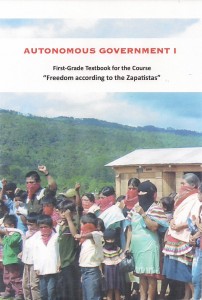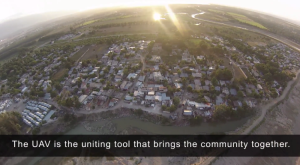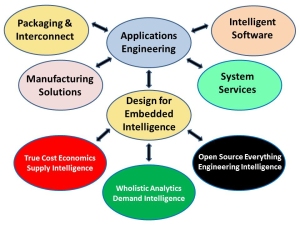
Jean Lievens: BitCoin Basics – Decentralized Autonomous Organizations (DAO), Distributed Anonymous Computing, Embedded Time-Stamped Contracts, and the Elimination of Bankers AND Lawyers?
Economics/True Cost, Governance, Innovation
Bitcoin’s blockchain could revolutionize more than just how we do business
Gordon Fletcher
The Conversation, 01 Oct 2014
EXTRACTS
Cryptocurrencies are novel as they are only possible because of the ready availability of high-speed computing and networks. They are a challenge to today’s currencies because of their decentralised nature, taking them out of national governments’ control. … What has been given less attention is the mechanism that makes the bitcoin network possible, the blockchain. . . . The use of the blockchain means that each contract is distributed across the network with time triggers agreed and written into the contract. … The Ethereum White Paper outlining the concepts and aims of the project describes how using the blockchain can be used to form decentralised autonomous organisations (DAO). … Various controversial claims around Ethereum suggest it will remove the need for lawyers, or even the need for bankers. … In a similar way open innovation could become a more powerful mechanism by using the blockchain as an arbitrator that offers attribution of original ideas in the correct chronological order. The blockchain can also be applied to education, used to verify attendance and identity for exams held at remote locations. … Ethereum is just the first to exploit the blockchain in novel and creative ways. Others are already arriving, for example IBM’s Adept project takes the blockchain in an entirely different direction, putting it at the centre of a future internet of things. Here the blockchain is used to authenticate devices so they can communicate with each other, using the blockchain to store a record of devices that have done so.
Finn Jackson: Can Monasteries Be a Model for Reclaiming Tech Culture for Good?
Governance, Innovation, P2P / Panarchy
This article describes an initiative more in line with the approach I would take:
“find a place with unmet needs and unused space to lend a building to a group of young hackers. Live together cheaply, building open-source infrastructure for the commons. Repeat until it becomes a network.”
Can Monasteries Be a Model for Reclaiming Tech Culture for Good?
Nathan Schneider
The Nation, 27 August 2014
hristian monasticism began in earnest in the fourth century CE, just after Constantine made Jesus Christ the official god of Rome. No longer persecuted, believers who craved a holiness less compromised by empire fled to the desert and set up communes. These monastics came to wield power in their own right, putting on display a more strenuous, radical faith. Their successors became Europe's chief scholars and inventors and also served as guardians for the technology of writing.
Continue reading “Finn Jackson: Can Monasteries Be a Model for Reclaiming Tech Culture for Good?”
Jean Lievens: Gerry Mooney on Open Scotland — Hybrid Grassroots Activism Empowered by Social Media
03 Economy, 11 Society, Crowd-Sourcing, Governance, Politics
Social media and grassroots activism have taken Scotland to the brink of independence
Gerry Mooney
The Conversation, 8 September 2014
EXTRACTS
If you wanted an explanation for the momentum that has carried the Yes campaign to the brink of victory in the Scottish referendum, you have to look at what’s happening on the ground. The extent to which the independence referendum has engaged and mobilised people during the campaign is palpable.
. . . . . . .
Yet as tends to be forgotten, the pro-independence movement also includes The Scottish Green Party; The Scottish Campaign for Nuclear Disarmament; The Scottish Socialist Party; the socialist party Solidarity; Women For Independence; the artists and creatives group National Collective and the socialist Radical Independence Campaign. Yes Scotland is a loose amalgam and umbrella of different pro-independence groups and individuals. A significant number of front-line activists campaigning under the Yes Scotland banner represent ordinary people with no party political membership. Some have never been involved in political activism before.
. . . . . . .
The demarcation between professional politicians and this grassroots mobilisation of ordinary people appears to be blurred in this contemporary Scottish political landscape. It is evident that a hybrid movement has emerged within the campaign, which according to Tommy Sheridan “dwarfs the anti-poll tax campaign” that he led in the late 1980s.
. . . . . . .
The opportunity to build a new Scotland free from nuclear weapons, austerity and welfare cuts has widespread appeal. It is this concern with social justice and welfare that has galvanised support for Yes.
Berto Jongman: Naomi Klein on Capitalism versus Climate Change — a “People’s Shock” Coming? Robert Steele Disagrees — Precipitants of Revolution Missing
11 Society, Civil Society, Crowd-Sourcing, Cultural Intelligence, Ethics, Governance, Liberation Technology, Officers Call“Worth a look.”
Naomi Klein to Degrowth Conference: Climate Change Can Deliver ‘People's Shock'
Status quo is not an option if we are to rein in runaway emissions, This Changes Everything: Capitalism Vs. the Climate author says in address to conference
“You're having the core conversation of our time.”
That was the message delivered on Tuesday by author Naomi Klein to participants of a conference whose focus is on “concrete steps towards a society beyond the imperative of growth.”
Klein's opening address to the Fourth International Conference on Degrowth for Ecological Sustainability and Social Equity, which kicked off Tuesday in the German city of Leipzig, made perfect sense, as the themes of her new book, This Changes Everything: Capitalism Vs. The Climate, overlap those of the conference — that addressing the climate crisis is incompatible with the current growth-focused economy.
Graphic: Embedded Intelligence — Adding Open Source Everything (Engineering Intelligence), True Cost Economics (Supply Intelligence) and Holistic Analytics (Demand Intelligence)
Analysis, Citizen-Centered, Data, Design, Earth Orientation, Economics/True Cost, Education, Governance, Graphics, ICT-IT, Innovation, Innovation, Leadership-Integrity, Manufacturing, Materials, Multinational Plus, Policies-Harmonization, Political, Processing, Reform, Resilience, Resilience, Science, Software, Sources (Info/Intel), Strategy-Holistic Coherence, Tribes, True CostPatrick Meier: Using UAVs for Community Mapping & Disaster Risk Reduction — The Haiti Example
Crowd-Sourcing, Culture, Drones & UAVs, Geospatial, Governance
Using UAVs for Community Mapping and Disaster Risk Reduction in Haiti
“What if, to solve our problems, we simply need to rise above them?” CartONG and France’s OpenStreetMap (OSM) community recently teamed up to support OSM Haiti’s disaster risk reduction efforts by deploying a small UAV, “which proved very useful for participatory mapping.” The video documentary below provides an excellent summary of this humanitarian UAV mission which took place just a few weeks ago.

As I noted in this earlier blog post on grassroots UAVs, the use of UAVs at the community level can be viewed as an extension of community and participatory mapping, which is why community engagement is pivotal for humanitarian UAV deployments. In many ways, a micro-UAV can actually bring a community together; can catalyze conversations & participation, which should be taken as more than simply a positive externality. Public Participatory GIS Projects (PPGIS) have long been used as a means to catalyze community conversations and even conflict resolution and mediation. So one should not overlook the positive uses of UAVs as a way to convene a community. Indeed, as CartONG and partners rightly note in the above video documentary, “The UAV is the uniting tool that brings the community together.”


